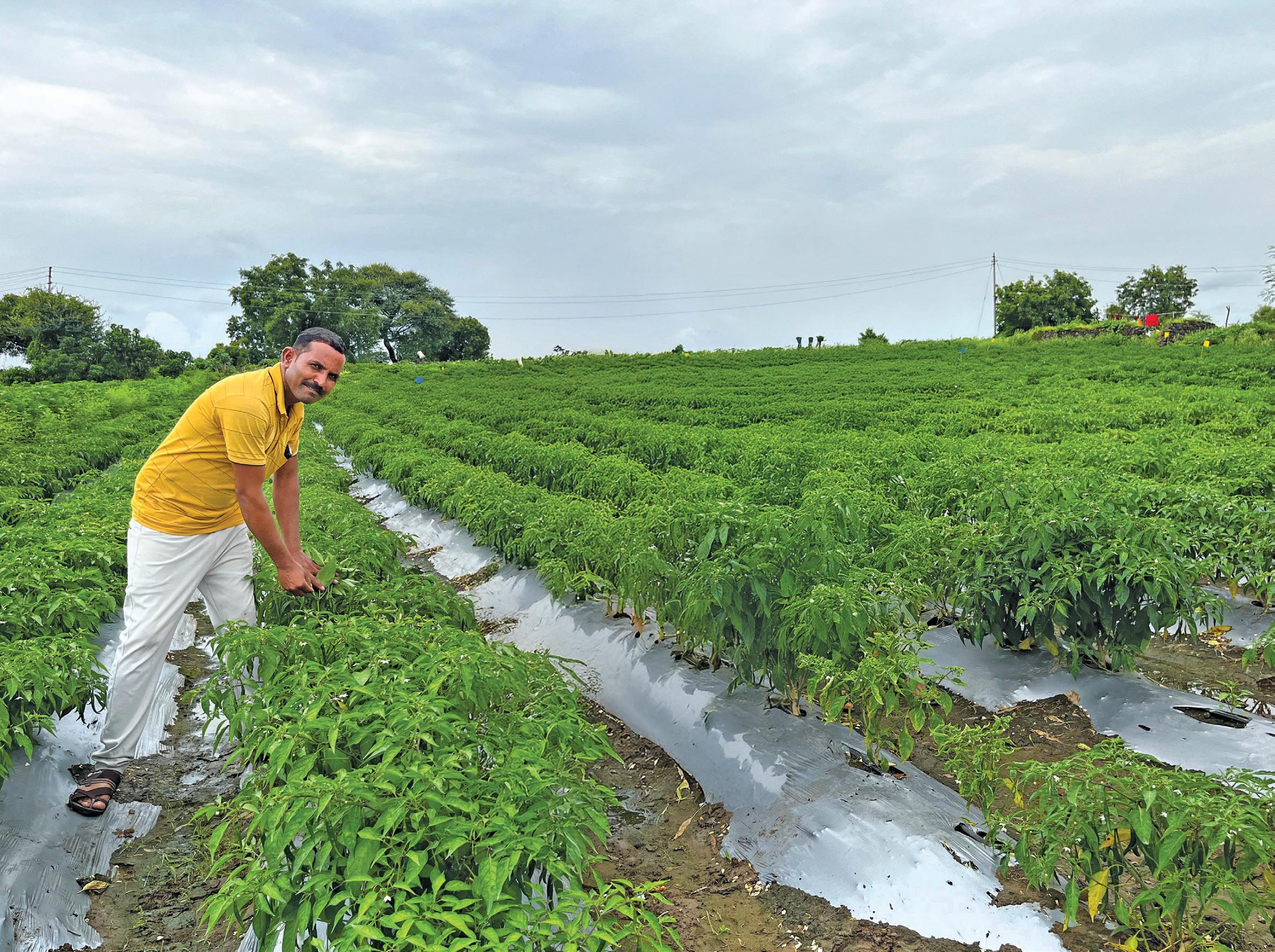Prøve GULL - Gratis
Every drop counts
Down To Earth
|February 01, 2025
In drought-prone Marathwada region, 14 villages have managed to counter water shortage by budgeting the resource

SHARDA AGALE cannot forget the days when she had to walk several miles multiple times a day to fetch drinking water.
Her village Kotha Jahangir is in Jalna district of Maharashtra's Marathwada region-a semi-arid landscape with recurring droughts.
Water tankers supplied water to the village from January till the monsoon arrived in June. Though Sharda and her husband owned over 2 hectares (ha), they were forced to migrate in search of work during the rabi (winter) crop season because there was no water to irrigate the land. Same was the story in almost all the 350 households of the village.
That was a decade ago. Now, a variety of kharif (monsoon) and rabi crops flourish in the village.
When Down To Earth visited Kotha Jahangir in August 2024, its farms were lush with soybean, chilli, cotton, groundnut, maize, tomato, ladyfinger, brinjal and green chillies that are exported to Bangladesh.
The remarkable transformation is the result of water budgeting introduced around 2014.
"Twice a year, the residents of Kotha Jahangir do water budgeting to ensure crop cultivation is in tune with the amount of water available, both through rainfall and groundwater. It is like the grocery budget or the monthly household budget we prepare to ensure we do not overspend," says Shyam Padulkar, regional manager in Aurangabad division of Watershed Organization Trust (WOTR), a Pune-based nonprofit involved in training farmers on water stewardship and water budgeting. "In May, water budgeting is done for the kharif season, and the exercise is repeated in October when water budgeting is done for the rabi season," he adds.
The village has formed a 17member Village Water Management Team that carries out the budgeting with participation from all the villagers, including the 30 landless families in the village. The committee has 5-6 gram TH panchayat members, an ex-sarpanch and five womНо en members.
Denne historien er fra February 01, 2025-utgaven av Down To Earth.
Abonner på Magzter GOLD for å få tilgang til tusenvis av kuraterte premiumhistorier og over 9000 magasiner og aviser.
Allerede abonnent? Logg på
FLERE HISTORIER FRA Down To Earth

Down To Earth
COP OF TALK
The UN's 30th climate summit, COP30 in Belém, was billed as the COP of truth and implementation.It was an opportunity for the world to move beyond diagnosis to delivery. Instead it revealed a system struggling to prove its relevance.
14 mins
December 01, 2025
Down To Earth
1,500 days, and an alarm for new climate
SEASONS ARE the compass that guide humans to survive and thrive as a society. What happens if seasons lose their distinct character and predictable rhythm? This is no longer a theoretical question. The Earth is entering a new climate regime, its atmosphere now saturated with greenhouse gases at levels without precedent in human history. And the earliest sign of this shift is the near-dissolution of familiar seasons; all merging and dissipating like the pupa inside the chrysalis, but, not to give birth to that mesmerising butterfly. This metamorphosis is manifest in the blizzard of weather events, extreme in severity and unseasonal by nature and geography.
2 mins
December 01, 2025

Down To Earth
Rights in transit
A recent dispute over transport and trade of kendu leaves in Odisha highlights differing interpretations of forest rights laws in the state
6 mins
December 01, 2025
Down To Earth
Roots of peace
Kerala's forest department plants fruit and fodder trees to ease human-wildlife tensions
2 mins
December 01, 2025

Down To Earth
Flattened frontiers
Efforts to reclaim degraded land from Chambal ravines expose both people and biodiversity to ecological risks from erosion and flooding
5 mins
December 01, 2025

Down To Earth
INDIA'S DRY RUN
India is poised to be a global hub of data centres—back-end facilities that house servers and hardware needed to run online activities.
21 mins
December 01, 2025

Down To Earth
Bangla generic drugs to the rescue
A buyer's club for generic cystic fibrosis drugs sourced from Bangladesh highlights the country's laudable pharma development
4 mins
December 01, 2025

Down To Earth
Direct approach
A new direct cash transfer scheme as well as decades of women-centric programmes yield an electoral windfall for the ruling alliance in Bihar
5 mins
December 01, 2025

Down To Earth
HIDDEN RESOURCE
Punjab's 1.4 million abandoned borewells offer a chance to mitigate flood damage and replenish depleting groundwater
4 mins
December 01, 2025
Down To Earth
Corporate bias
INDIA'S DRAFT Seeds Bill, 2025, introduced by the Centre in mid-November, proposes a few key changes.
1 min
December 01, 2025
Listen
Translate
Change font size
